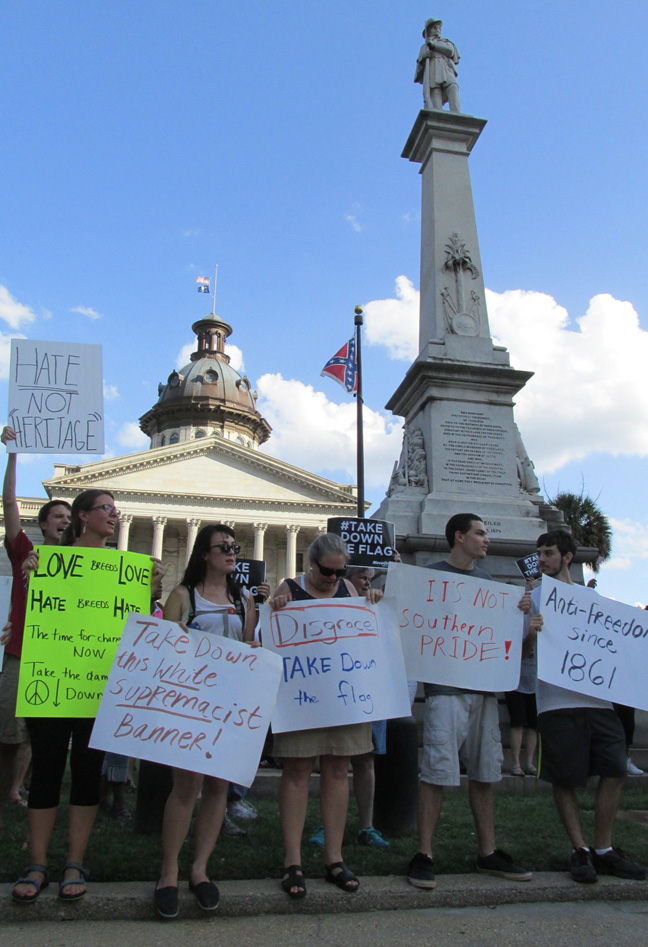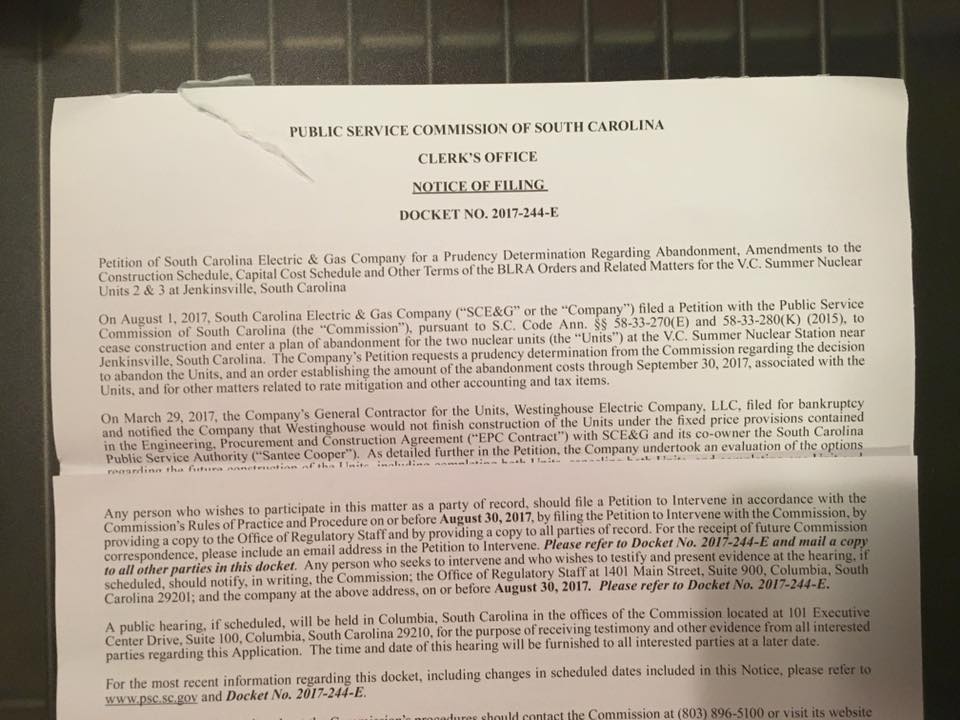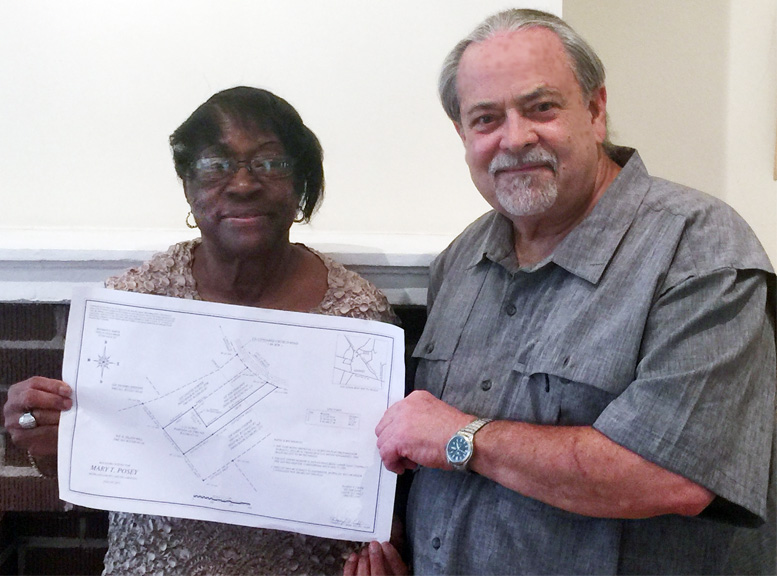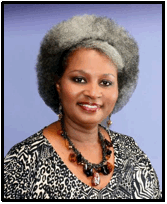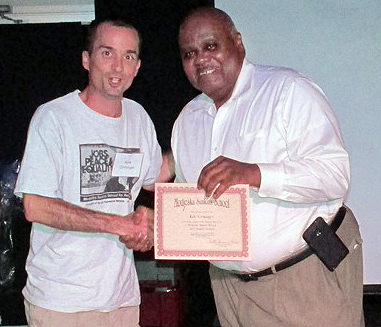 Rep. Joe Neal congratulations Kyle Criminger at the 2015 graduation ceremony for the inaugural class of the Modjeska Simkins School.
Rep. Joe Neal congratulations Kyle Criminger at the 2015 graduation ceremony for the inaugural class of the Modjeska Simkins School.
As the Modjeska Simkins School prepares for its upcoming session, we thought it timely to share Kyle’s thoughts about the school and lessons learned there.
• • •
We got perspective at the Modjeska Simkins School: a big-picture analysis—a Modjeska Simkins analysis—of South Carolina’s history.
We learned that there is a direct line of malice from John C. Calhoun, who defended slavery as “a positive good,” to Ben “Pitchfork” Tillman’s white supremacist state Constitution of 1895 (under which our state continues to operate to this day), to the coded racism of Harry Dent and Lee Atwater’s Southern Strategy. Always the substance of South Carolina public policies has shown that black lives don’t matter here.
The imbalance of power in South Carolina is no accident. Because of unprecedented partisan gerrymandering, we have the least competitive legislative elections in the United States. Three out of four representatives faced no major party competition in the 2014 general election.
“Most of our legislators in South Carolina are winning with 99% of the vote,” said Brett Bursey, Executive Director of the SC Progressive Network. “The old Soviet elections we used to make fun of? Well, we now have that here.”
South Carolinians have the lowest combined state and federal tax burden in the country, yet our legislature tells that us we’re broke when we’re not. In fact, we leave more money on the table in special interest tax exemptions than we take in. We get immoral budgets and refused Medicaid Expansion for 250,000 of us because of petty partisan politics.
It’s maddening, but our problems aren’t new. “The names and faces have changed,” notes Progressive Network Communications Director Becci Robbins in Modjeska Monteith Simkins—A South Carolina Revolutionary, “but the political and social dynamics of exclusion, extremism and institutional racism remain stubbornly intact in South Carolina. We share Modjeska Simkins’ frustration and sense of urgency.”
Time and again, South Carolina history shows us how Modjeska Simkins and so many others have resisted. We are not alone, you see. Have you heard of the Yemassee War, or the Stono Rebellion? Denmark Vesey, or the Grimké sisters? What about Robert Smalls and our state’s Reconstruction legislature, which was the only majority black House of Representatives in the nation? The Lighthouse and Informer newspaper, Judge J. Waties Waring, or the Rev. J.A. Delaine?
Maybe you don’t know these names, events and institutions because the “winners” have written our textbooks. Generations of South Carolinians used Mary Simms Oliphant’s infamous history text into the 1980s. The book spoke of “happy slaves,” and was sympathetic to the Ku Klux Klan. (In the 1920s, as a teacher at Booker T. Washington High School in Columbia, Modjeska Simkins refused to use the Oliphant textbook, deeming it racist.)
So we have on the one hand a state that has lived and died by the Golden Rule. Everybody knows the Golden Rule: regrettably, he who has the gold makes the rules. But beside that Rule, we also have stories of rebellion and revolutionary spirits, a South Carolina “people’s history” of organizing. And the task Modjeska Simkins and so many other South Carolinians like her have laid out before us: we must organize to form a community of shared values.
That is 24-7 work. It’s a process.
Organizing means preparing for opportunities. It entails building an organization that returns phone calls, pays staff, and fosters relationships in the community based on trust and confidence. And it is strategic, a disciplined use of collective energies on effective projects, not by simply being reactive. The best organizers leverage already-existing, well-thought-out organizing tools, and tap into the collective wisdom and experience of those who have come before, just like Modjeska Simkins did.
We must connect the dots to see that there is only one struggle, and it is for human rights. “If you have enough sense in your noggin,” Simkins once said, “you’re going to know a fight is there—and not just for black people, but for all mankind.”
The need for exploring our history has never been more critical. The Modjeska School provides an education like none other in South Carolina, one that benefits not just the students but the larger community, as well. As a graduate, I can attest to its value.
• • •
Kyle Criminger, a Spanish-language interpreter, serves as Co-chair of the SC Progressive Network. He was one of 35 inaugural graduates of the Modjeska Simkins School for Human Rights. You can support the school by making a secure donation here, or by calling 803-808-3384 or sending an email to network@scpronet.com.
 Join grassroots activists from across the state for the SC Progessive Network’s fall retreat, a weekend of fellowship, networking, and organizing. This is our first overnight meeting since politics imploded on the national and state level. The landscape has shifted dramatically, and we will take advantage of new opportunities while addressing new challenges.
Join grassroots activists from across the state for the SC Progessive Network’s fall retreat, a weekend of fellowship, networking, and organizing. This is our first overnight meeting since politics imploded on the national and state level. The landscape has shifted dramatically, and we will take advantage of new opportunities while addressing new challenges. Friday is for early registration, beginning at 4pm; dinner on your own. Once you’ve registered, we will send program details and a list of things to bring.
Friday is for early registration, beginning at 4pm; dinner on your own. Once you’ve registered, we will send program details and a list of things to bring. 

